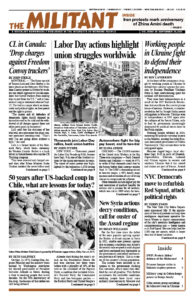Since Aug. 7, more than 800 prisoners in Bahrain have been conducting that country’s largest-ever hunger strike, protesting intolerable conditions, including systematic mistreatment, medical neglect and limited visitation.
Their actions have inspired street protests led by prisoners’ families, above, calling for release of their relatives and for King Hamad bin Isa al-Khalifa, who has ruled Bahrain since 2002, to step down. In recent years such protests have been rare given the government’s clampdown on political dissent.
Many of the hunger strikers have been imprisoned since taking part in the mass popular uprising that erupted throughout Bahrain in 2011, inspired by revolts elsewhere in the Middle East and North Africa. That year, over 100,000 people gathered across the country to demand an end to discrimination against the majority Shiite population, freedom for political prisoners and the replacement of the Sunni monarchy with an elected government. The rulers were only able to suppress the protests with assistance from military forces provided by the rulers of Saudi Arabia and the United Arab Emirates.
The protests today are demanding prisoners get more time out of their cells — currently limited to one hour per day — as well as proper medical care and the right to hold prayers in dedicated spaces.
Bahrain, an island state of 1.6 million people just off the coasts of Saudi Arabia and Qatar, is where the U.S. Navy’s Fifth Fleet is based. The U.S. rulers have been staunch allies of the monarchy there.
The prison hunger strike combined with the street protests have helped generate new openings to defend and advance the fight for political freedoms.


